小学动词时态讲解及练习 (1)
【动词的时态】小初英语衔接 知识精讲+即学即练(通用版 含答案)
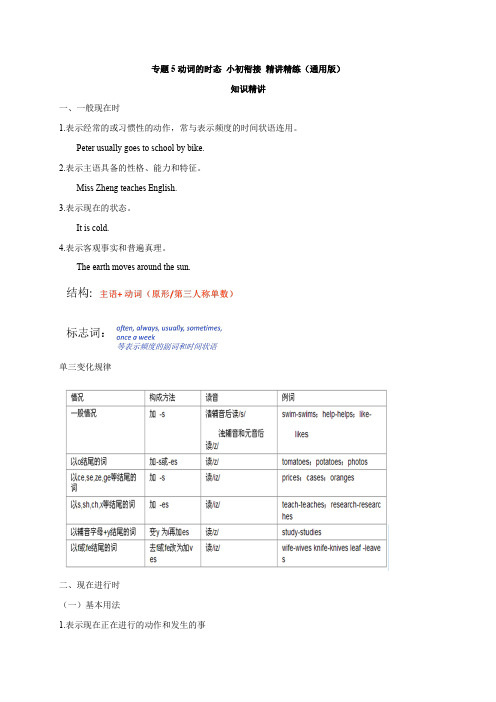
专题5动词的时态小初衔接精讲精练(通用版)知识精讲一、一般现在时1.表示经常的或习惯性的动作,常与表示频度的时间状语连用。
Peter usually goes to school by bike.2.表示主语具备的性格、能力和特征。
Miss Zheng teaches English.3.表示现在的状态。
It is cold.4.表示客观事实和普遍真理。
The earth moves around the sun.单三变化规律二、现在进行时(一)基本用法1.表示现在正在进行的动作和发生的事Eg. ---What are you doing?---I am reading a book.2.有时表示现阶段正发生的事,但此刻动作不一定正在进行Eg. He is teaching at the school.We are learning Unit5 these days.3.现在进行时的句子中常有now,或在句首常出现Look! Listen!等提示词Eg. Listen! Danny is singing in the room.He is doing his homework now.(二)结构: be+doing ( be要根据主语作人称和数的变化)(三)句型转换1.肯定句转换成否定句,要在be 后加not 构成eg. We are reading English now.✂We are not reading English now.2.陈述句转换成一般疑问句,把be动词提到句首eg. The student is drinking.✂ Is the student drinking?3.陈述句转换成特殊疑问句,由“疑问词+一般疑问句”构成eg. He is working.✂ What is he doing?助记口诀:doing进行时很好记,be加动词-ing;直加双写去哑e,分词构成须仔细;别说be 无词义,主语和它最亲密;变疑问be 提前,否定not 再后添;何时要用进行时look,listen,now标记.三、一般过去时(simple past tense)(一)基本用法:表示•过去某个时间里发生的动作或状态;•过去习惯性、经常性的动作、行为;•过去主语所具备的能力和性格。
四年级英语:动词时态与语态的转换知识点+练习
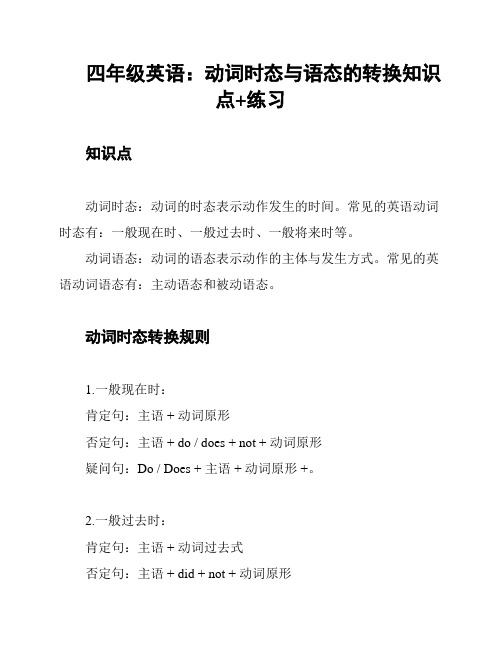
四年级英语:动词时态与语态的转换知识点+练习知识点动词时态:动词的时态表示动作发生的时间。
常见的英语动词时态有:一般现在时、一般过去时、一般将来时等。
动词语态:动词的语态表示动作的主体与发生方式。
常见的英语动词语态有:主动语态和被动语态。
动词时态转换规则1.一般现在时:肯定句:主语 + 动词原形否定句:主语 + do / does + not + 动词原形疑问句:Do / Does + 主语 + 动词原形 +。
2.一般过去时:肯定句:主语 + 动词过去式否定句:主语 + did + not + 动词原形疑问句:Did + 主语 + 动词原形 +。
3.一般将来时:肯定句:主语 + will + 动词原形否定句:主语 + will + not + 动词原形疑问句:Will + 主语 + 动词原形 +。
其他时态的转换规则可以参考相关教材。
动词语态转换规则1.主动语态:肯定句:主语 + 动词原形 / 动词时态否定句:主语 + do / does / did + not + 动词原形 / 动词时态疑问句:Do / Does / Did + 主语 + 动词原形 / 动词时态 +。
2.被动语态:肯定句:主语 + am / is / are / was / were + 过去分词否定句:主语 + am / is / are / was / were + not + 过去分词疑问句:Am / Is / Are / Was / Were + 主语 + 过去分词 +。
练题1.把下列句子改成一般现在时的否定句:I like apples。
-。
I do not like apples.___ to music。
-。
She does not listen to music.2.把下列句子改成一般过去时的疑问句:___。
-。
Did they play basketball?___。
-。
Did I watch a movie yesterday。
动词填空练习讲解 (加情态动词或助动词)

动词填空六种时态的构成及用法(1)一般现在时用法:①现在经常性的状态或动作;②客观事实和真理。
构成:①be+表语;②实义动词作谓语标志词:often, sometimes, usually, always, never,twice a month, every day/week/month/year...(every 系列)例句:He usually gets to school early.他通常很早到校。
The moon moves around the earth.月亮绕着地球转。
练一练1.认识从实践开始Knowledge practice.2.如果明天下雨,我们就不去公园了。
If it tomorrow,we to the park.【答案】1. begins with.2.rains,won’t go(2)一般过去时用法:表示过去的动作或状态。
构成:①was/were+表语;②实义动词作谓语标志词:a moment ago,just now,...ago, yesterday, last night/week/month...(last系列)例句:We went to Yunnan last Monday.上周一我们去了云南。
1.She (not visit)her aunt last weekend.2.My friend,Lucy, (study)for the math test and (practice)English last night.【答案】1.didn’t visit 2.studied practiced(3)一般将来时用法:表示将来的动作或状态。
构成:①will/shall+动词原形;②am/is/are going to+动词原形标志词:tonight, tomorrow, from now on, soon, in the future, next year...(next系列)例句:The twins will go to the cinema with their parents tonight. 这对双胞胎今晚将和他们的父母一起去看电影。
动词时态课件(1)

我们时常相互通信。
常与always,usually,often,sometimes,every day,once a week,yearly 每年,monthly每月, 等时间状语或频率副词连用。
(2)表示主语现在的性格、特征、能力 eg.He works hard.他努力工作
(3)表示客观事实或普遍用法
分 现在分词 词作用,表主 状语、宾语补足
词
动
语
起形容词、副 过去分词 词作用,表被
动
The steam is seen rising from the wet clothes.
一般现在时 : 一般过去时
am is are
was were
do(does)
did
1.一般现在时
(1)表示经常发生或习惯性的动作或状态 eg.We often write to each other.
②主语+was/were+going to +动词原形
例:I didn’t know if she would come. I wasn’t sure whether he would do it . I didn’t know if she was going to come. Wang Lei said that she was going to visit
返回
三、按动词的形式可以分为谓语动词和非谓语动词
1、谓语动词(如下)
2、非谓语动词
形式
意义
与主语在人称一致 人称
举
例
I am reading now. 第一人称
数 时态 语态
语气
与主语在数上一致
He writes well. 第三人称单数
小学英语语法复习动词时态专项讲解和练习
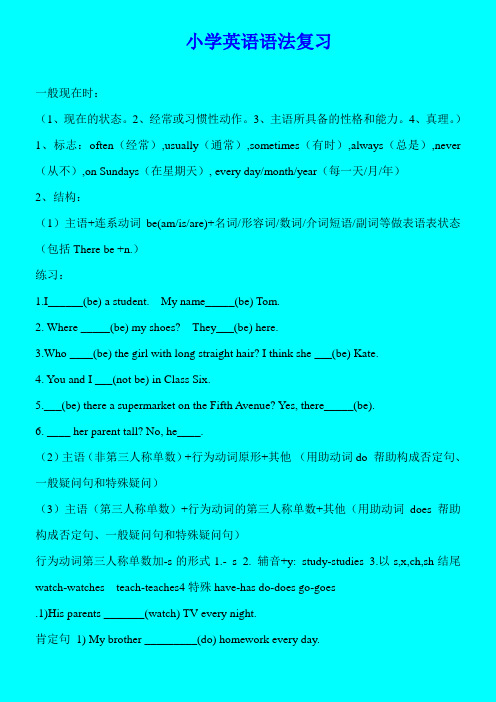
小学英语语法复习一般现在时:(1、现在的状态。
2、经常或习惯性动作。
3、主语所具备的性格和能力。
4、真理。
)1、标志:often(经常),usually(通常),sometimes(有时),always(总是),never (从不),on Sundays(在星期天), every day/month/year(每一天/月/年)2、结构:(1)主语+连系动词be(am/is/are)+名词/形容词/数词/介词短语/副词等做表语表状态(包括There be +n.)练习:1.I______(be) a student. My name_____(be) Tom.2. Where _____(be) my shoes? They___(be) here.3.Who ____(be) the girl with long straight hair? I think she ___(be) Kate.4. You and I ___(not be) in Class Six.5.___(be) there a supermarket on the Fifth Avenue? Yes, there_____(be).6. ____ her parent tall? No, he____.(2)主语(非第三人称单数)+行为动词原形+其他(用助动词do 帮助构成否定句、一般疑问句和特殊疑问)(3)主语(第三人称单数)+行为动词的第三人称单数+其他(用助动词does 帮助构成否定句、一般疑问句和特殊疑问句)行为动词第三人称单数加-s的形式1.- s 2. 辅音+y: study-studies 3.以s,x,ch,sh结尾watch-watches teach-teaches4特殊have-has do-does go-goes.1)His parents _______(watch) TV every night.2)His parents _________(not watch) every night.否定句2)My brother________(not do)homework every day.3)_____his parents_____(watch) TV every night?一般疑3)______ your brother _____ homework every day?Yes, they _______. No, they _______.Yes, he______. No, he _________.4)When___ his parents _____(watch) TV?特疑4)When _____ your brother ____(do) homework?5)They watch TV every night.He does homework every day.二.现在进行时:表示说话瞬间或现阶段正在进行的动作。
动词八大时态用法以及练习总结精华
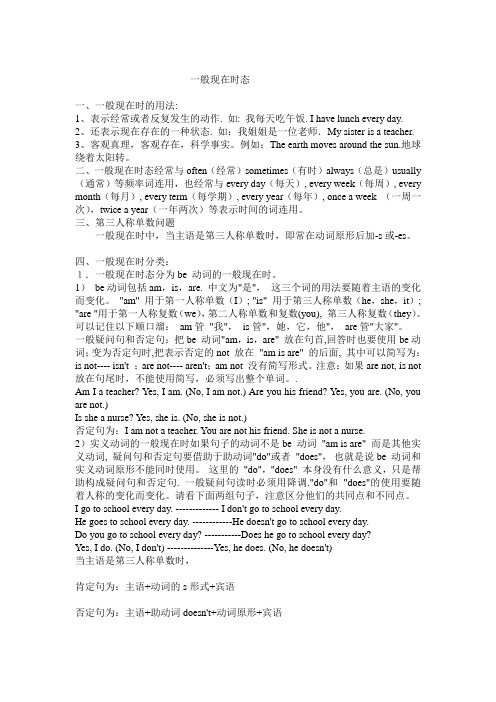
一般现在时态一、一般现在时的用法:1、表示经常或者反复发生的动作. 如: 我每天吃午饭. I have lunch every day.2、还表示现在存在的一种状态. 如:我姐姐是一位老师.My sister is a teacher.3、客观真理,客观存在,科学事实。
例如:The earth moves around the sun.地球绕着太阳转。
二、一般现在时态经常与often(经常)sometimes(有时)always(总是)usually (通常)等频率词连用,也经常与every day(每天), every week(每周), every month(每月), every term(每学期), every year(每年), once a week (一周一次),twice a year(一年两次)等表示时间的词连用。
三、第三人称单数问题一般现在时中,当主语是第三人称单数时,即常在动词原形后加-s或-es。
四、一般现在时分类:1.一般现在时态分为be 动词的一般现在时。
1)be动词包括am,is,are. 中文为"是",这三个词的用法要随着主语的变化而变化。
"am" 用于第一人称单数(I); "is" 用于第三人称单数(he,she,it); "are "用于第一人称复数(we),第二人称单数和复数(you), 第三人称复数(they)。
可以记住以下顺口溜:am管"我",is管",她,它,他",are管"大家"。
一般疑问句和否定句:把be 动词"am,is,are" 放在句首,回答时也要使用be动词;变为否定句时,把表示否定的not 放在"am is are" 的后面, 其中可以简写为:is not---- isn't ;are not---- aren't;am not 没有简写形式。
动词时态语态 讲解
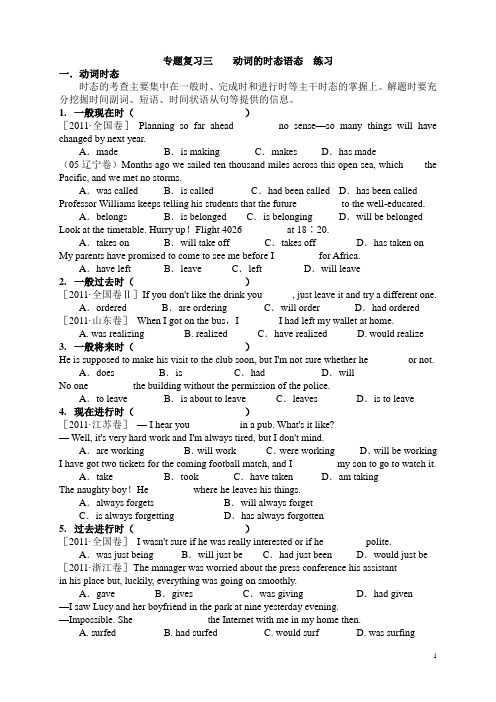
专题复习三动词的时态语态练习一.动词时态时态的考查主要集中在一般时、完成时和进行时等主干时态的掌握上。
解题时要充分挖掘时间副词、短语、时间状语从句等提供的信息。
1.一般现在时()[2011·全国卷]Planning so far ahead________ no sense—so many things will have changed by next year.A.made B.is making C.makes D.has made(05辽宁卷)Months ago we sailed ten thousand miles across this open sea, which ___ the Pacific, and we met no storms.A.was called B.is called C.had been called D.has been called Professor Williams keeps telling his students that the future ________ to the well-educated.A.belongs B.is belonged C.is belonging D.will be belonged Look at the timetable. Hurry up!Flight 4026 ________ at 18∶20.A.takes on B.will take off C.takes off D.has taken on My parents have promised to come to see me before I ________ for Africa.A.have left B.leave C.left D.will leave2.一般过去时()[2011·全国卷Ⅱ]If you don't like the drink you______, just leave it and try a different one.A.ordered B.are ordering C.will order D.had ordered [2011·山东卷]When I got on the bus,I________I had left my wallet at home.A. was realizingB. realized C.have realized D. would realize3.一般将来时()He is supposed to make his visit to the club soon, but I'm not sure whether he _______ or not.A.does B.is C.had D.willNo one ________ the building without the permission of the police.A.to leave B.is about to leave C.leaves D.is to leave4.现在进行时()[2011·江苏卷]— I hear you________ in a pub. What's it like?— Well, it's very hard work and I'm always tired, but I don't mind.A.are working B.will work C.were working D.will be working I have got two tickets for the coming football match, and I ________ my son to go to watch it.A.take B.took C.have taken D.am takingThe naughty boy!He ________ where he leaves his things.A.always forgets B.will always forgetC.is always forgetting D.has always forgotten5.过去进行时()[2011·全国卷]I wasn't sure if he was really interested or if he ________polite.A.was just being B.will just be C.had just been D.would just be [2011·浙江卷]The manager was worried about the press conference his assistant________ in his place but, luckily, everything was going on smoothly.A.gave B.gives C.was giving D.had given—I saw Lucy and her boyfriend in the park at nine yesterday evening.—Impossible. She ________ the Internet with me in my home then.A. surfedB. had surfedC. would surfD. was surfing—Hello, everyone! Have you heard the meeting will be put off till next Tuesday?—That's what we ________ about when you came in.A.are talking B.were talking C.talk D.talked6.将来进行时()—The movie 2012 will be on at 8 pm. What about picking you up at 7?—All right. I will have come back from work by then, and I ________ you at home.A. will wait forB. will be waiting forC.have been waiting for D. am waiting forI ________ on my report next week so I won't be able to meet you any day.A.am working B.will be workingC.was working D.have been working7.现在完成时()[2011·安徽卷]—I didn't ask for the name list. Why ________ on my desk?—I put it there just now in case you needed it.A. does it landB. has it landedC. will it landD. had it landed —We________ to put off our school sports meet until next month.—I ________ that.A.decided; didn't expect B.haven't decided; haven't expectedC.have decided; didn't expect D.decide; haven't expected(江西)—What is the price of petrol these days?—Oh,it ________ sharply since last month.A.is raised B.has risen C.has arisen D.is increased8.过去完成时()[2011·山东卷]She was surprised to find the fridge empty; the children _______ everything!A.had been eating B.had eaten C.have eaten D.have been eating [2011·福建卷]Last month, the Japanese government expressed their thanks for the aid they________ from China.A. receiveB. are receivingC. have receivedD. had received9.将来完成时()[2011·天津卷]On her next birthday,Ann _____ married for twenty years.A.is B.has been C.will be D.will have been [2011·江苏卷]— Tommy is planning to buy a car.— I know. By next month, he________ enough for a used one.A. savesB. savedC. will saveD. will have saved10.现在完成进行时()— Mum, I really think Dad should have a break and get relaxed.— Yes. He ________ too long.A. readB. has been readingC. had readD. is reading —Those scientists invented a robot to care for kids!—It's not surprising. They ________ wonders all the time.A.worked B.were working C.work D.have been working Since the beginning of the vacation,I ________ across the country,and my next stop is the Wuyi Mountains.A.had traveled B.will travel C.have been traveling D.was traveling 11.过去完成进行时()[2011·全国卷]When Alice came to, she did not know how long she ________ there.A.had been lying B.has been lying C.was lying D.has lain 12.过去将来时()The computers made by our company sell best, but several years ago no one could have imagined the role in the markets that they _______A. were playingB. were to playC. had playedD. playedWhen I was a child,I ________ often play with my little dog near the river,which I missed so much years later.A.should B.would C.could D.might(湖南)When he ________ the door,he found his keys were nowhere.A.would open B.opened C.had opened D.was to open13.过去将来完成时()But for the help of my English teacher, I ____ the first prize in the English Writing Competition.A. would not winB. would not have wonC. would winD. would have won Thank you for all your hard work last week. I don’t think we ____ it without you.A. can manageB. could have managedC. could manageD. can have managed二.动词语态被动语态的考查热点主要是及物动词被动的各种常用时态的构成。
谓语动词的时态(讲解与练习)
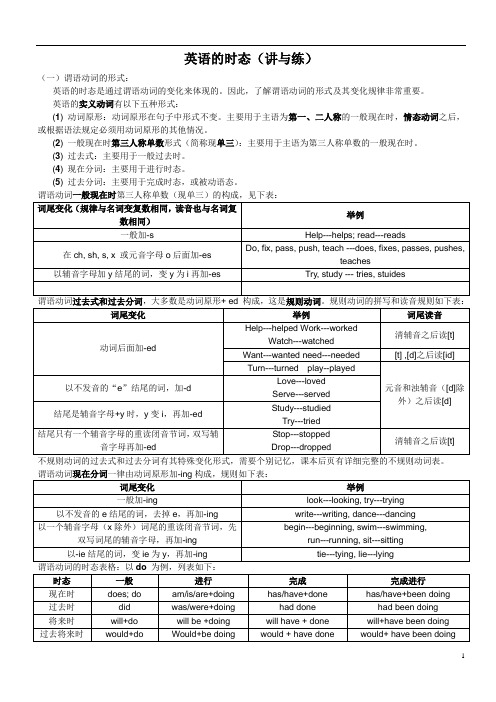
英语的时态(讲与练)(一)谓语动词的形式:英语的时态是通过谓语动词的变化来体现的。
因此,了解谓语动词的形式及其变化规律非常重要。
英语的实义动词有以下五种形式:(1) 动词原形:动词原形在句子中形式不变。
主要用于主语为第一、二人称的一般现在时,情态动词之后,或根据语法规定必须用动词原形的其他情况。
(2) 一般现在时第三人称单数形式(简称现单三):主要用于主语为第三人称单数的一般现在时。
(3) 过去式:主要用于一般过去时。
(4) 现在分词:主要用于进行时态。
(5) 过去分词:主要用于完成时态,或被动语态。
(二)谓语动词的时态:“时态”就是通过谓语动词的形态变化,来表达动作发生的时间(现在、过去、将来、过去将来)及所处的状态(一般、进行、完成、完成进行)。
1、一般现在时(1)构成:通常以动词原形表示。
主语为第三人称单数时,用单三形式。
(2)用法:1)表示现状、性质、状态和经常的或习惯性的动作。
He has an uncle.他有个叔叔。
Autumn follows summer.夏天之后是秋天。
这些动词可与often, usually, always, sometimes, every day, once a week, on Sundays, never 等表示经常性或习惯性的时间状语连用。
例如:Do you often go to the cinema? 你经常去看电影吗?Tom does not study as hard as Jane. 汤姆在学习方面不如简努力。
My father never takes a bus; he walks to his office.我父亲从来不坐公共汽车,他走着去上班。
2)表示客观现实或普遍真理。
The sun rises in the east. 太阳从东方升起。
A horse is a useful animal. 马是一种有用的动物。
When Winter comes, can Spring be far behind? 冬天来了,春天还会远吗?(英国浪漫主义诗人雪莱的名句。
- 1、下载文档前请自行甄别文档内容的完整性,平台不提供额外的编辑、内容补充、找答案等附加服务。
- 2、"仅部分预览"的文档,不可在线预览部分如存在完整性等问题,可反馈申请退款(可完整预览的文档不适用该条件!)。
- 3、如文档侵犯您的权益,请联系客服反馈,我们会尽快为您处理(人工客服工作时间:9:00-18:30)。
总结
动词时态
名称
特征词
结构
一般现在 Usually通常, often经常, 非三单+动原 always总是, never从不, 三单+动词s\es sometimes有时,every 每一…… seldom 极少
现在进行 句首有look! listen,!
句中或句尾有now,
It’s ...(几点了) . 后的句 子
games. You You aren’t playing computer
games. He He isn’t playing computer
games.
一般疑问句 把be拉到句首,后面的句子不变。
Are you playing computer games? Are you playing computer games? Am I playing computer games? Are we playing computer games? Is he playing computer games? Is she playing computer games? Is it playing computer games? Are they playing computer games?
flowers in the morning?
( A) 9) Sometimes I ________ flowers
in the morning.
A water
B.waters C.watering
现在进行时结构 am\is are +动词ing, 特征词:句子前有look!或Listen! 句子前或句子未有now。
It is playing computer games now.
否定形式 be+ not +doing
I I am not playing computer games. We We aren’t playing computer
games. You You aren’t playing computer
一般现时:
1、经常性发生的事情、习 惯和爱好等
2、或者是指一些客观存在 的事实或规律。
时间词有: Usually通常, often经常, always总是, never从不, sometimes有时,every 每一…… s#43;动词-s\es
I often play computer games. We never play computer games. You always play computer games.
(A)3) We are _______ lesson now.
A.having B.has
C. have
A( )4)We ________football next Sunday.
A. will play
B. play C. plays
( B)5) Is he __some reading tomorrow?
否定形式 非三单动词前+ don’t
三单动词前+does+not
I don’t play computer games. We don’t play computer games. You don’t play computer games. They don’t play computer games. He doesn’t play computer games. She doesn’t play computer games. It doesn’t play computer games.
现在进行时:
说话时正在做的事情。
关键词:
句首有look! listen,! 句中或句尾有now, It’s ...(几点了) . 后的句子
动词构成 be(am is are)+doing
I am playing computer games now. They are playing computer games now. We are playing computer games now . You are playing computer games now . He is playing computer games now. She is playing computer games now.
一般疑问句 非三单句子+Do。
三单句子前+Does。
I Do you play computer games? We Do you play computer games? You Do I play computer games? You Do we play computer games? He Does he play computer games? She Does she play computer games? It Does it play computer games? They Do they play computer games?
be(am\is\ar e + doing
练习
( B)1)Look! They are ________ .
A.are swimming B.swimming C..swims
( B)2)Listen! Sally ________ in the classroom.
.A.singing B. is singing C.sings
They usually play computer games.
You often play computer games.
She seldom plays computer games. It never plays computer games. He often plays computer games.
A.do B. going to do C.will do
( B) 6)Jiamin ____to Guangzhou in 2014.
A.go
B. will go C.goes
( B)7) My mother often____flowers in
the morning.
( A)8) Does your mother usually ______
